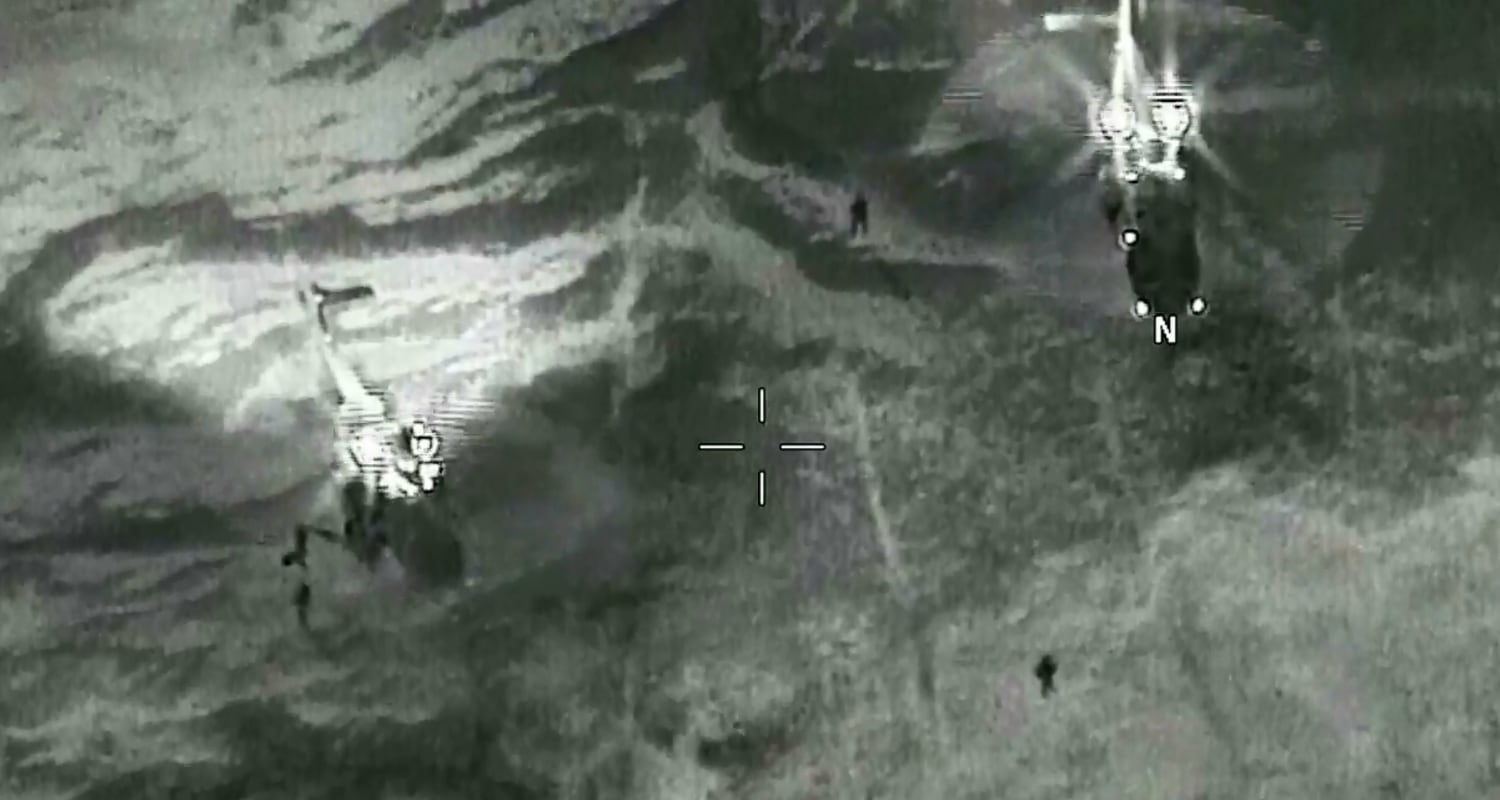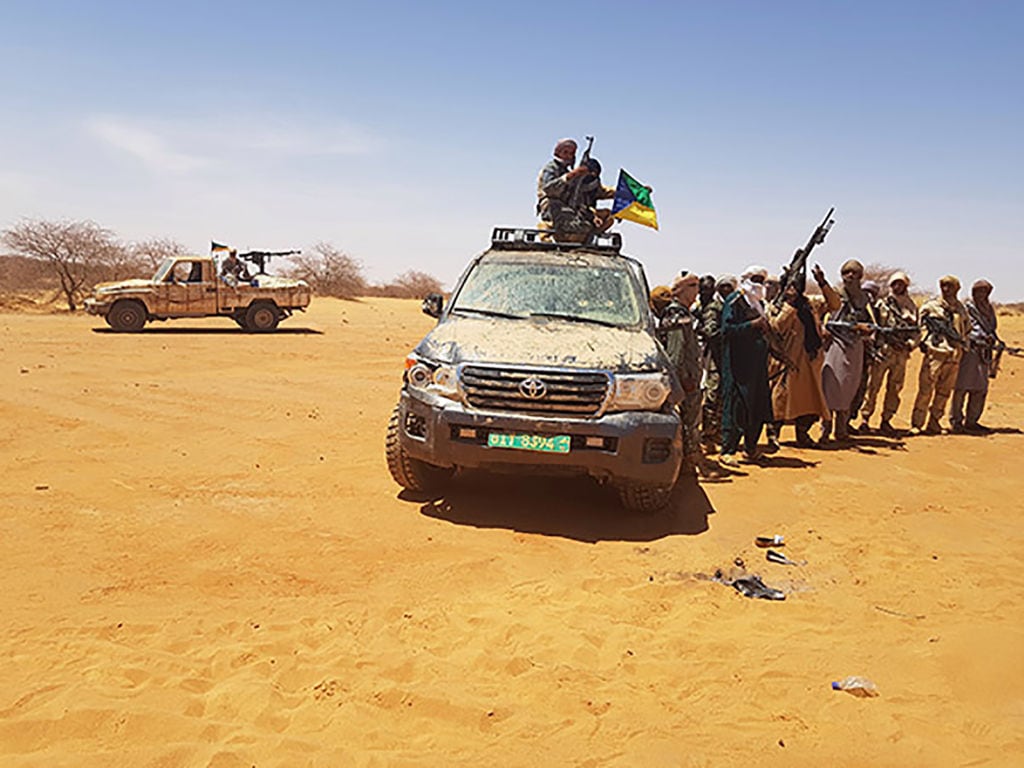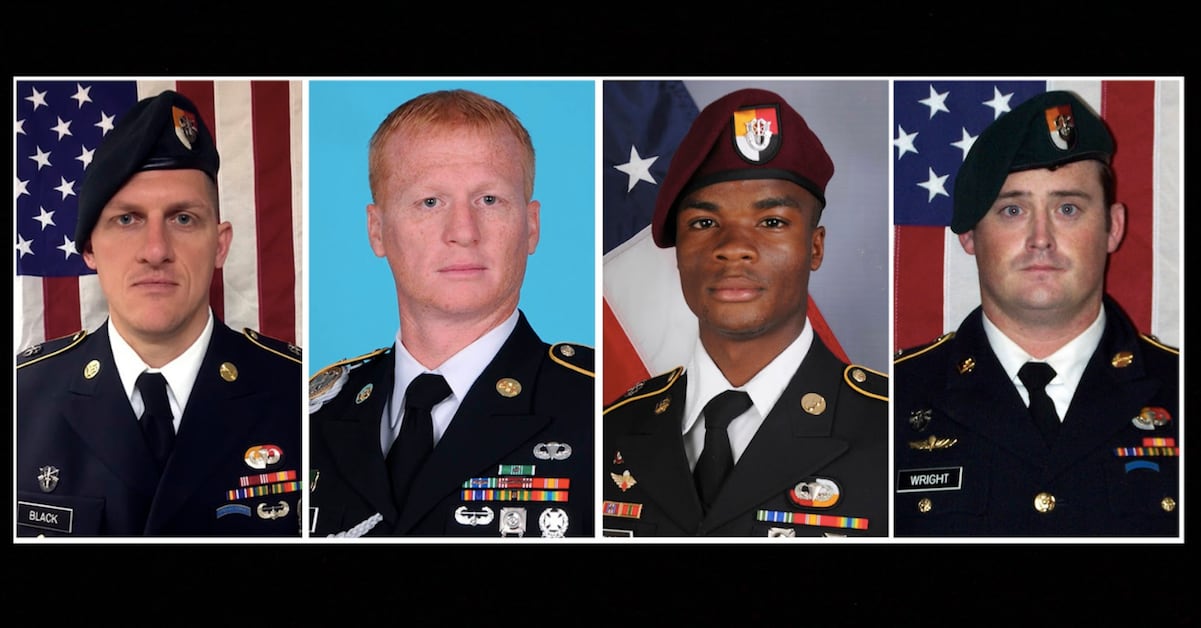The Army is awarding nine valor medals to honor the actions of those involved in the October 2017 Niger ambush, including four Silver Stars and several Bronze Stars with Valor.
Two of the Silver Stars will be posthumously awarded to Green Beret Staff Sgt. Dustin M. Wright and Sgt. La David Johnson. Sgt. 1st Class Jeremiah W. Johnson and Staff Sgt. Bryan C. Black will posthumously be awarded the Bronze Star Medal with Valor.
Other members of the 11-man Army special operations team that was ambushed alongside a 30-man Nigerien partner force will also receive valor awards, including two Silver Stars, at least one Bronze Star with Valor and various Army Commendation Medals.
The names of those soldiers were not disclosed.
“The awards will be officially announced and presented in accordance with the families’ wishes, and at a time that is appropriate to honor the actions and sacrifice associated with the valor awards,” Pentagon spokeswoman Navy Commander Candice Tresch said Thursday.
The special operations joint team, known as Team Ouallam, was ordered to continue a raid on a local ISIS commander against the better judgment of the commander on the ground after the helicopter-borne assault team they were supporting backed out due to weather issues.
Team Ouallam continued the mission and was subsequently ambushed by an assaulting force three times their size and equipped with medium and heavy machine guns, rocket propelled grenades and mortars.
“Individual members of Team Ouallam performed numerous acts of bravery under fire," Tresch said. "If not for the valorous actions by several team members, additional loss of life probably would have occurred.”
‘It could have been much worse’
On that point, ret. Brig. Gen. Donald Bolduc, the former commander of Special Operations Command Africa, agrees.
“It could have been much worse,” Bolduc said, noting that the captain in charge of the team on the ground has not received enough credit for leading his men out of the firefight against a numerically superior force.
“He did a hell of a job pulling his team out of that position," Bolduc added. "Had he not been able to fire and maneuver the way he did, holding people back, we could be talking about something even worse — an entire Special Forces team getting killed and the entire Nigerien unit getting killed.”
Some of the early blame for the ambush appeared to be placed on that ground force commander and a company commander at the base from where the mission was launched.
In the redacted investigation released Thursday morning by the Pentagon, it’s clear that by the time the helicopter-borne assault time scrubbed their portion of the mission, the ground commander was asking to return to base, but higher-ups ordered him to continue on the raid.
Rep. Michael Waltz, R-Fla., the first Green Beret elected to Congress, told Army Times before the investigation was released that he still had questions regarding whether Team Ouallam “went out on their own and perhaps a little rogue, like the previous report intimated, or whether that team was directed to do so.”
“That direction may not have gone as high as AFRICOM but somewhere in the chain of command which, my understanding is ... went back to Chad before it went over to Germany," he said. "I think the bigger point for me is the families don’t feel like they’ve received a consistent story of what happened.”
Bolduc, who commanded Special Operations Command Africa from April 2015 to June 2017, said the investigation into the ambush was bungled from the start.
“I don’t think that if you did a real look into this with someone with operational knowledge of AFRICOM, SOCOM and the operational teams, they would come to the same conclusions,” Bolduc said, adding that he does not challenge the details within the report, just the final punishments meted out.
Under resourced
At the end of the redacted investigation, officials noted that the contracted medical evacuation capability in Niger does not actually meet AFRICOM’s personnel recovery requirement for operations against violent extremist groups in West Africa.
That contract was established in partnership with a civilian company, Berry Aviation, in 2014. The contract requires Berry Aviation to provide all day and all night rotary‐wing assets, fixed-wing takeoff aircraft and paramedic‐level field and in‐flight patient care for personnel recovery missions.
But in reality, the “contracted aircraft lack a robust communication package and capability," the report reads. “Berry aircraft are more akin to the Life Flight capability.”
One impact of the poor communication package was a three-hour delay in declaring the need for a personnel recovery mission.
“Although this did not directly affect the end result of the event, it highlights the need for greater efficiency," the investigation stated. All four soldiers killed in action sustained wounds that were “immediately fatal or fatal in a short time,” it reads.

AFRICOM has been a historically under resourced combatant command, according to Bolduc. In an environment that is comparable in level of threat to Afghanistan and Iraq, troops face a shortage of air power and medical evacuation assets.
When he was in charge of the region’s special operations theater command, he said he lobbied for additional assets, and even presented a plan to augment the civilian contract.
“We would have had to prioritize at my headquarters," Bolduc said. "Some missions would go on in East Africa and at the Lake Chad Basin or in West Africa and North Africa and then move assets around to ensure we had the right, or at least adequate, personnel recovery assets in place.”
“We couldn’t get anybody to agree to that even though it wouldn’t have come at the expense of operations somewhere else in the world,” he said, while stressing that in the end, the lack of capabilities is not as important as the lack of planning to account for it.
The French and Nigerien aerial and ground response was found to be instrumental in saving the lives of the remaining team members, particularly a pair of French Mirage fighter jets that conducted shows of force just as the team captain had rallied his remaining troops on the ground.
The French jets scared off the attacking ISIS fighters, but the aircraft could not establish communications with Team Ouallam and therefore could not positively distinguish the friendlies from the enemy fighters, despite the ground commander wanting to call for close air support.
There was an ISR aircraft overhead that communicated with the ground team and relayed their situation to headquarters, but it was unarmed. U.S. drone aircraft began flying armed missions in Niger months after the October 2017 ambush.
“We had all the permissions to do that in 2013, but we couldn’t get anyone to approve that in Washington,” Bolduc said.
Critics have also questioned why the U.S. mission was conducted in low-visibility vehicles, rather than the up-armored gun trucks commonly used in other combat theaters. But the use of those vehicles makes sense to Bolduc.
Heavy vehicles get bogged down, aren’t supported by the poor roads in Niger and would require more frequent maintenance, he explained.
“It’s not the vehicles that caused this problem, it’s poor decision by senior leaders,” he added.
Reprimanding operators
Training prior to deployment was also not up to standard for “an environment that is as dangerous as Afghanistan and Iraq, especially because of the lack of resources,” Bolduc said.
When troops did get to theater, the turnover and hand-off from the previous team was sub-par.
“That falls to senior leaders of the stateside command and theater level commanders,” he said. “No one at the team level should have been punished at all, neither the captain, nor the company commander.”
Letters of reprimand are also sometimes controversial because they cannot be challenged in an adversarial court system, said ret. Army Lt. Col. Jeffrey Addicott, a former military attorney who was a senior legal adviser to Army Special Forces.
“There’s no avenue for a soldier to plead their case,” Addicott said. “It’s a tool the military uses far too often because they know if they aired it in a court-martial, the results may be very different.”
“If they did something that only deserved a letter of reprimand, I would err towards giving them nothing,” he added. “If they really did something wrong, then charge them with a crime — dereliction of duty or conduct unbecoming of an officer.”

The fact that senior leaders weren’t held accountable dials into a problem that still lingers within the military: “organizational nepotism,” according to Bolduc.
In this case, Bolduc said the senior officers who escaped blame early on weren’t necessarily bad officers. In fact, Col. Brad Moses, who led 3rd Special Forces Group at the time and who some say should have been punished, is a competent leader who Bolduc said would make a “great general officer.”
But Moses largely escaped blame in the public sphere, and such a blemish on his record could have derailed his career trajectory. That’s also part of the problem, according to Bolduc.
“Why should one mistake even ruin anyone’s career?" he said. "It drives this parallel culture of protection.”
As for the valor awards already announced, Bolduc said he wouldn’t be surprised if they are eventually upgraded based on reports that some within the special operations community expected higher awards for the fallen soldiers.
“Almost every Distinguished Service Cross I recommended for my guys in Afghanistan have been subsequently upgraded,” Bolduc said. “I feel comfortable that the awards as they’re recommended from the lowest commander are the awards we should go with."
Kyle Rempfer was an editor and reporter who has covered combat operations, criminal cases, foreign military assistance and training accidents. Before entering journalism, Kyle served in U.S. Air Force Special Tactics and deployed in 2014 to Paktika Province, Afghanistan, and Baghdad, Iraq.









